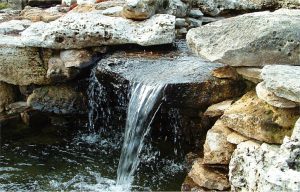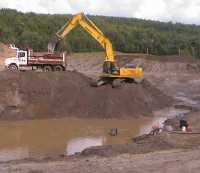S.O.S. Lake and Pond Construction
Please note: we do not build ponds. Our business is not one to help you with a design, a budget or provide assistance in your pond construction project. We receive a high volume of this type of request; thank you for your understanding. The article below is from 2003 and will point you in the right direction. Please contact your local authorities to get advice. And when your pond is built, we will be there to help you maintain water quality!
Here are a few tips before you start your lake or pond construction
The pond is a unique ecosystem made up of many parts, and to remain in balance these various components must interact and evolve in a natural way. If you think building a beautiful pond means it is enough for you to dig a hole and let it fill with water, you may be in for a rude awakening!
Before beginning an excavation project for a lake, a pond or even of a water garden, it is important not to neglect the prepara tion phase, which accounts for half of the success of your installation. The other half rests with the expertise of the contractor engaged to carry out the work. In order to guide you through the preliminary stages of your pond project, let us suggest a few questions you should ask before considering the excavation, as well as the precautions to be taken during this important phase.
tion phase, which accounts for half of the success of your installation. The other half rests with the expertise of the contractor engaged to carry out the work. In order to guide you through the preliminary stages of your pond project, let us suggest a few questions you should ask before considering the excavation, as well as the precautions to be taken during this important phase.
First of all, where should you locate the pond? For best results, you should choose a site that has the characteristics of poorly drained land: specific vegetation or surface water outcrops. In many cases, the most suitable natural site for your pond is unfortunately not the one that suits your personal objective. If you persist in wanting to build your pond on a site that is not suitable, it will be more expensive to build and the risk of experiencing water quality problems will be greater.
If you persist in wanting to build your pond on a site that is not suitable, it will be more expensive to build and the risk of experiencing water quality problems will be greater.
After having initially defined the best site for the installation of your watery ecosystem, you must investigate the nature of the soil. If the location is wet, it may be due to an outcrop of bed rock or the presence of an impermeable layer such as clay, which prevents water from infiltrating down deep. Where the bed rock is level, the possibility of building a pond is restricted. On the other hand, if the ground is sandy or mainly loose gravel, it may be necessary to use of a membrane to line the pond, which will increase the project costs.
Next, investigate the water source available for your pond.
Next, investigate the water source available for your pond. This step is very important in order to prevent common pond problems. Do not build your pond in a brook; not only will you seriously degrade the quality of the brook, you will also be frowned upon by the Minister of the Environment. Also, a pond built on a brook tends to be constantly overwhelmed with sediments during times of heavy rain.
There are never too many rocks on a pond construction site and they can always be used in the landscaping of the shorelines or in the creation of cascades.

- One of the most common errors consists of wanting to remove excavated material with trucks. The use of trucks will greatly increase the cost of building your pond and should only be used as a last resort if you have insufficient place on your property for material storage.
- If at all possible, try to be present during the excavation process, or hire a professional supervisor to assure quality and efficient job performance.
- Ensure your contractor does not bury any large rocks at a depth greater than two feet or, worse yet, that they do not charge you to remove large rocks which they can then sell elsewhere. There are never too many rocks on a pond construction site and they can always be used in the landscaping of the shorelines or in the creation of cascades.
The excavation of a pond is not a thing to be taken lightly and the expertise of the contractor you hire to do the job can make a world of difference. Never choose a contractor without first checking references and seeing a portfolio of previous projects. Ask several firms for cost estimates but remember to analyze the various plans carefully, as often a contractor will woo you with a low cost estimate and then as work progresses the costs will multiply and by then you are committed to finishing the project. A technically realistic evaluation of the project should be a detailed appraisal of all aspects involved and not just rough estimates. In the end you can save yourself much grief and expense by seeking the advice of experts.